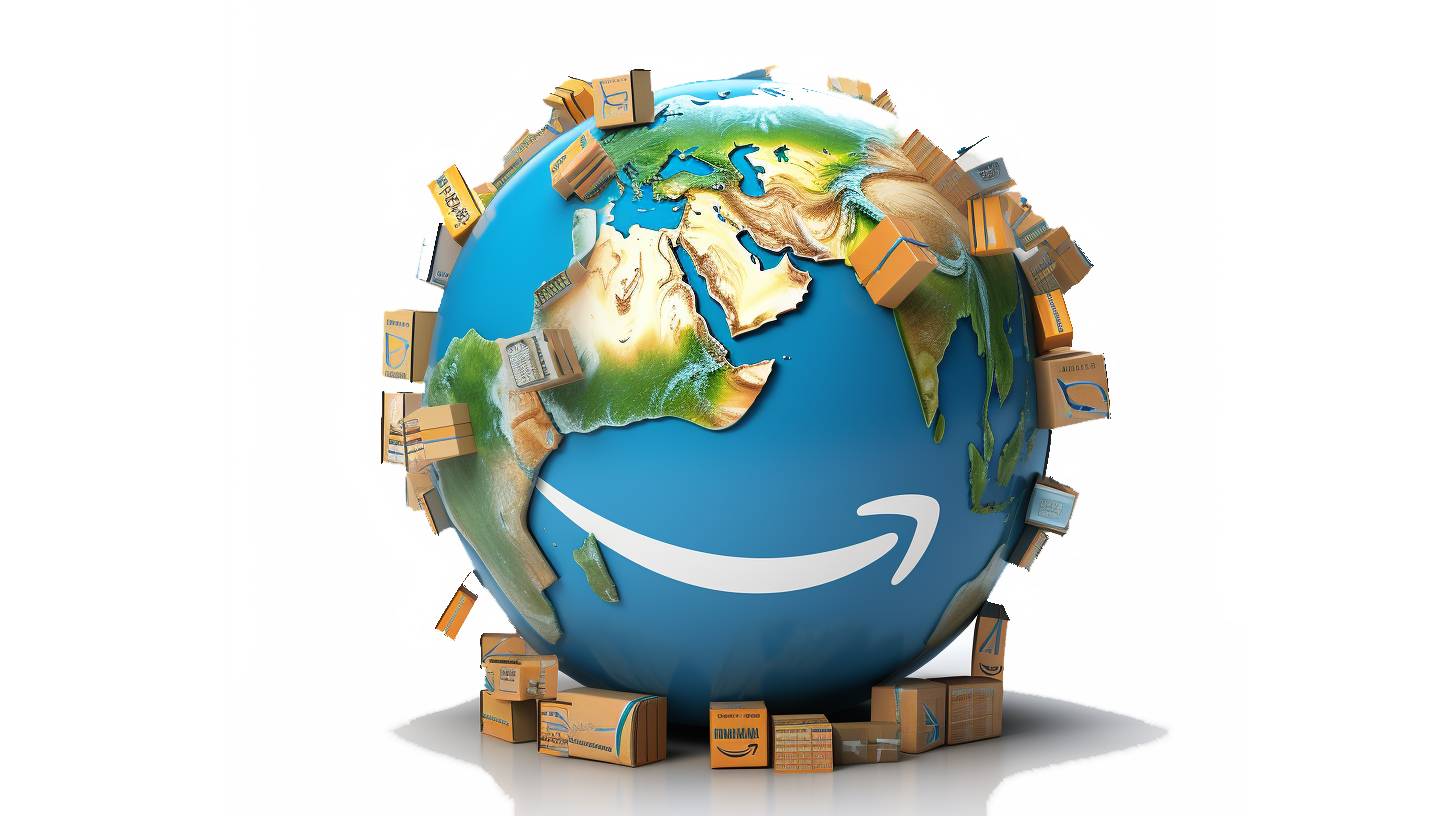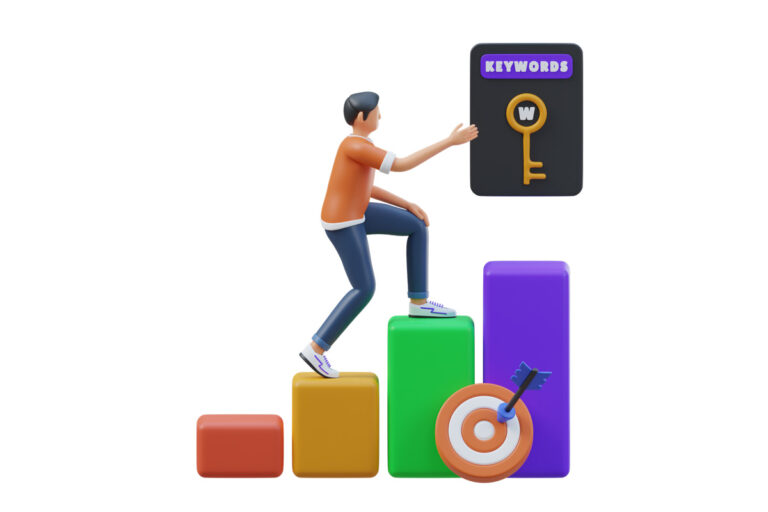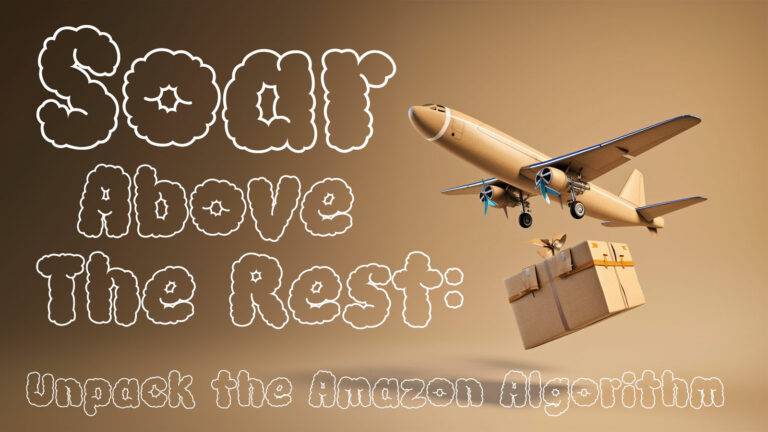Amazon has become a behemoth in the online retail sphere, with its virtual marketplaces running rampant throughout cyberspace. But what lies hidden behind Amazon’s success? This blog dives into the heated discussion of Amazon’s effects on small companies and economy as a whole. We’ll investigate how their expansion affects competition across multiple industries – examining both sides of this intricate issue to gain more comprehension about why people are so torn over Jeff Bezos’ empire of e-commerce nowadays. The impact it makes on consumers, employees and businesses will also come under scrutiny; ultimately giving us a peek at what debate surrounds this humongous firm’s role within modern day trading .
Overview of Amazon’s Dominance in the Global Market
Amazon has been a powerful presence on the international market since it started. As one of the world’s top online retailers, it has become an influential figure in both e-commerce and global commerce alike. This impact has created both beneficial and detrimental consequences for businesses, customers, as well as economic systems all over the globe. In this article we’ll investigate Amazon’s prevalence more thoroughly; analyzing its controversial effects on small companies plus how it affects economies worldwide – before finally discussing potential solutions to address these problems.
No doubt, Amazon is a great success. It’s amazing that it has achieved the worth of $1 trillion dollars and keeps creating more values for people. In addition to this, consumers are highly benefited from its low-priced items as well as stress-free shopping experience. People really count on Amazon when they need something essential – be it groceries or electronic products – and get those at their homes in time faster than any local store or online shop could provide them with such facility!
Even though Amazon has brought tremendous benefit to our lives, its dominance in the market has raised some concerns regarding smaller businesses- especially those operating within retail markets where they go toe to toe with Amazon for customers and their money. Studies have shown that when either a new sector of the market is tapped by Amazon or an existing one expands due it’s operations; Other small competitors suffer greatly from competition with such a giant because there is usually huge price differences between them (in favor of big business). This could potentially be detrimental to many startups and can present serious challenges if not managed properly.
This can create an environment where small business owners have a tough time just surviving, as their sales take a hit due to competition from the giant. Additionally, these smaller companies don’t usually have access to capital needed for investment or growth; this further diminishes their chances of staying in the game compared with larger retailers who do possess those resources. On top of that, there are worries about job losses too: when big firms enter markets previously held by smaller ones they often employ fewer workers than before because they depend on automation which reduces labor costs but doesn’t guarantee quality products/services being offered; it translates into less jobs overall in places where employment was abundant prior to large corporation takeover. How does all this impact local communities? Are changes like these actually beneficial in any way?
Analyzing the Dark Side of Amazon’s Influence
We all know how successful Amazon has been in the last decade. But what is the cost for this success? It’s undeniable that Amazon holds a huge power over our economy and society, which we’ve never seen before. We can’t ignore its negative effects such as taking away chances of small businesses to compete fairly or controlling retail industry too much. Small business owners probably feel overwhelmed when competing against an enormous company like Amazon; it seems almost impossible!
Some retailers have been able to use digital marketing and e-commerce strategies effectively, but plenty of smaller ones simply can’t match the reach or productivity that Amazon has. This was something already happening before Covid-19 came along, with more customers turning online for their shopping needs – and a lot of them buying everything from Amazon only. It’s not just about lost sales either; this is having an impact on employment in certain industries too. What opportunities are there for businesses affected by this? How do they make sure they don’t get left behind if the trend continues?
These days, more and more people are opting to buy their goods online from mega-corporations like Amazon rather than supporting the local businesses or mom-and-pop shops. This obviously means less job opportunities in these areas, which can have a domino effect on other industries as well – for instance think of tourism or hospitality services that rely heavily upon foot traffic generated by shoppers who would normally go looking for stuff at physical stores. How will this affect them?
Amazon has tremendous clout when it comes to pricing and consumer behavior. A wealth of evidence shows that prices on products sold through Amazon’s marketplace usually drop, leading to lower prices everywhere else – even stores not selling them via the platform! This goes towards demonstrating just how much power Amazon holds in this market; one can only imagine what could happen if they were to decrease their own costs significantly.
It’s true that sometimes consumers can get a good deal from companies such as Amazon, who often offer products at deep discounts. This might sound great on the surface, but it may not be sustainable or even healthy for business in the long run because if everyone is forced to match those low prices they won’t make enough money to provide quality goods and services overall – something which could hurt us all eventually!
On top of this we have to recognize just how much convenience technology giants like Amazon bring: near-instant access to an amazing variety of products at competitively low costs. But there are risks associated with allowing one company so much control over our shopping habits & trends; If left unchecked these issues could cause bigger problems down the line. What kind of economic implications does this pose? How will it shape what people buy and use in their everyday lives? These are important questions worth exploring further!
Impact of Amazon Dominance on Small Businesses
The success of Amazon has been unprecedented. It’s now the biggest online retailer around, even bigger than Walmart in terms of market value. But despite its incredible achievement, not many people pay attention to the dark side of Amazon’s power – it had a harmful effect on small companies and local economies across America. Some might be wondering how this can happen? With their growing presence and reach throughout different cities and states as well as having products ranging from books to furniture delivered at stomp-on prices with lightning speed shipping capabilities, these conditions put independent business owners who have limited resources at a disadvantage when competing against such an agile giant like Amazon.
Amazon’s achievement has caused a huge cost for small business owners, with their profits decreasing or even vanishing completely as they try to contend with Amazon’s enormous range of products and aggressive pricing strategies. This is particularly true on the web where retailers have been made to either close down shop or adjust to an increasingly competitive environment that favors larger businesses who possess more resources at hand.
The repercussions of this are not just felt by entrepreneurs but entire communities too! It can be hard when you’re used to relying on local stores which no longer exist because online giants like Amazon have taken over – leaving towns without access shops people need in order raise families properly. Communities must think carefully about how to survive such changes; it requires effort from all involved if we want vibrant places full of opportunities and life instead of ghost-towns hollowed out by big corporations’ greed and ambition alone
Mom-and-pop stores closing down due to competition from Amazon means job losses and local tax revenues take a huge hit. This is especially troubling for rural communities that depend on the sales taxes derived from these smaller retailers in order to keep vital services such as police departments, fire stations, libraries, schools etc running smoothly. Economists feel that Amazon’s strong hold over markets implies an economy more dominated by large companies than small businesses which can cause innovation stagnation and consumers end up with fewer options eventually when few firms compete for customers’ attention. The USA once depended upon entrepreneurs owning little establishments; if they don’t stand their ground against tycoons like Amazon then our economic stability will be at stake ultimately!
The Economic Detriments from Amazon’s Monopoly
Amazon has ballooned into one of the largest companies globally and its influence can be seen in almost every sector. It’s revolutionized shopping, making it easier than ever for customers to make purchases on their web store with a few clicks. But there are some drawbacks that Amazon growth brought along – especially when it comes down to small businesses and macroeconomics as whole.
The most noticeable effect is on smaller firms who have always been an integral part of US economy providing job opportunities and money inflow across cities all over America.
Unfortunately, as Amazon’s business model keeps on dominating retail sales, local small businesses are getting hit. These days more and more shoppers opt to buy from the online behemoth rather than hitting up their hometown store due to the convenience it offers along with cost savings; leaving many a small business owners scratching their heads in an attempt of staying afloat.
But that isn’t all – Amazon also has some massive monopoly power giving them quite an unfair advantage when negotiating prices for products over other retailers which can’t even come close because they ditch out against its buying capabilities!
Consumers often go to Amazon for their purchases because they know the prices will be better than anywhere else. In theory, this is great but it can hurt smaller competitors who may not have comparable prices or selection options as those that Amazon offers through its network of third-party vendors. So these companies are placed in a tough spot – unable to keep up with low pricing and convenience provided by one of the biggest brands out there. It’s really an unfair advantage when you think about it – even more so if you’re stuck competing against them!
The problem with Amazon’s overpowering presence is they take away the competition between large-scale stores such as Walmart and Target. These organizations usually try to outdo each other on pricing in order to draw customers from one another, but now must face up against an immense force that most of time can’t be beaten on price or selection. This situation doesn’t bode well for these companies who simply don’t have what it takes to compete with a giant like Amazon – which items are cheaper? What type of selection do you prefer?
Moreover, a lot of shoppers nowadays don’t even bother visiting stores. They know they can purchase whatever item they need at lower price online either through Amazon Prime or any other third-party seller marketplace on the internet. This reduces competition between these physical retail shops and obviously puts pressure on their bottom lines due to lack of foot traffic coming into store locations – why go out when you could just buy it faster from wherever you are?
Wow, it’s certainly a bit concerning when one company holds such an incredible level of control over the retail market. Not to mention that said company already has their fingers in other industries like cloud computing (AWS) and streaming media (Prime Video). You have to wonder if this kind of concentration could lead to anti-competitive practices further down the road without any regulators stepping in? With tech giants like Apple & Google leading various industries now, where do we draw the line between fair competition and monopolistic behavior? It remains unclear how things will go but there needs to be serious discussion about what having Amazon firmly at pole position means for our economy both today and tomorrow – inside America as well as beyond its borders.
How Amazon Impacts Local Economies
The rise of Amazon to the top spot in retail has been nothing short of astonishing. In a matter of decades, this e-commerce giant completely changed the landscape and became an undeniable presence on global economy. But as it continues growing stronger, there are increasing concerns about how does it affects small businesses and local economies? The size and reach that Amazon holds gives them obvious edge over other smaller merchants – but what lies at stake here is much bigger than just profits.
With more than two million third-party sellers on its platform, Amazon provides customers with a huge variety of options at incredibly low prices – something local stores find difficult to beat. This has caused an increase in shoppers opting for shopping online from Amazon as opposed to their locals store leading to job losses and economic stagnation in many communities throughout the United States.
What is even scarier though, is that due this immense market power it holds;Amazon can crush competition easily while also dictating terms with suppliers which allows them drive down prices further year after year.
Economists have become concerned that this could cause a ‘race-to-the bottom’ dynamic, with companies forced into lower margins to compete against each other. This could result in fewer jobs and wages for the economy on the whole.
Also arising are questions about how Amazon will affect communities from a social perspective too. Will automation mean workers displaced by robots or algorithm? How will these changes influence local tax revenue when more services move online? And most importantly: can small businesses keep up with such huge digital presences like Amazon’s?
These queries don’t have straightforward answers but they do need answering if we want our towns and cities to survive during this internet era run by giants like Amazon.
Case Studies: Small Businesses Struggling Against Amazon
The story of Amazon’s rise has been extraordinary. It all began in 1994 when it started out as an online bookseller and now, it is the world’s leading e-commerce site and also one of the most valuable businesses in the globe. Regrettably, a lot of small companies are finding it difficult to go toe-to-toe with Amazon due to its dominance.
One outcome from their growth is that buyers benefit from lower prices because they have reduced running costs plus advantages provided by large production numbers. Does this mean people don’t have any other options than buying from such big corporations?
When it comes to shoppers, being able to buy items at lower prices can be beneficial. Yet this improved efficiency does come with a price tag and unfortunately, that burden falls upon small businesses who just don’t have the same pricing power or customer access as Amazon. These smaller companies experience shrinking profits due their inability to keep up with larger competitors when it comes resources and technology. Does this mean small businesses are doomed? Not necessarily – but they will need some creative thinking in order for them eventually compete on equal footing!
The effects of Amazon on small businesses is even more than pricing competition. Many proprietors have spoken up about feeling coerced by the firm’s assertive strategies, such as practicing predatory pricing or sealing off local markets with exclusive accords that impede other stores from competing well against them. These methods have been scolded by economists who claim they make an unbalanced platform where colossal organizations can get a one-sided advantage over smaller contenders who do not possess enough assets to compete properly with them. Have you ever experienced any sort of unfairness like this?
Moreover, some economists have expressed concern that Amazon’s monopoly could lead to even more economic imbalance. While sizable cities such as Seattle have seen a rise in job opportunities thanks largely to the presence of Amazon, these jobs don’t necessarily provide enough stability for local communities whose livelihoods depend on small businesses rather than large corporate players like Amazon. It has also been noted that wages offered by big corporations tend not be competitive compared those paid out by smaller employers and fail give workers an adequate salary or benefits package . This raises questions about whether people will end up poverty-stricken if small companies continue struggling compete with larger ones like Amazon?
Unpacking the Power Dynamics between Amazon and Small Enterprises
Since Amazon started doing business in 1994, it has been the king of online retail. Estimates now suggest that 40% of all e-commerce sales and an ever increasing proportion of total retail sales are due to Amazon’s influence. With this power comes debates about what kind of effect their might be on small businesses – afterall if it can control so much market share, surely other establishments could suffer?
The sheer size and scope of Amazon gives it immense power over small businesses when dealing with the setting of prices, decisions on which products should be sold or taken off shelves, and who can access their platform. This makes competition increasingly difficult for smaller companies in comparison to the larger ones that make up a considerable part of Amazon’s business model.
This unequal balance between big firms like Amazon and its little counterparts could also lead to unsavory deeds such as giving bigger corporations an unfair edge while pricing or controlling product availability. It raises questions why is there different rules set by large giants like them? Why is it so hard for existing regulations become applicable here too?
When it comes to the size of businesses, a large firm may benefit from their buying power when negotiating with suppliers. For instance, they could be offered lower prices or more favorable terms than those given to smaller companies – something that can give them an advantage over competitors. Additionally, if a company is selling through online marketplaces like Amazon then there’s no room for leniency; any failure to abide by rules and regulations will result in having their products removed without notice nor appeal process available. This just goes on further emphasize how important it is for companies utilizing such platforms are acting responsibly and adhering strictly by the platform’s guidelines – otherwise all your hard work might end up being wasted!
The dominance of large firms like Amazon is responsible for raising multiple concerns, such as competition within markets and anti-trust laws – intended to protect consumers from monopolistic behavior by powerful corporations. However, these rules are either not enforced or fail in preventing businesses from engaging in potentially unfair practices that reduce competition – creating less choice for customers who may have no other way than paying higher prices because there’s barely any alternatives available on the market. What we can see now is an ever increasing amount of evidence that points out many small businesses could be struggling due to larger companies entering new markets through online platforms – making it hard even impossible at times for them to keep up with customer demands and increased costs related with launching a business online (such as spending money on advertising). So does this mean our only option here would be relying solely on big players?
A Closer Look into the Losses: Economy Impact and Beyond
No doubt, Amazon has revolutionized the digital marketplace. Customers have access to products in a more convenient manner than before with lower prices. However, that same growth of Amazon is also causing economic disruption and unfortunately impacting small businesses around the country negatively. As we witness an increase in Amazon’s share of online retail sales worldwide, it brings us further closer to understanding how its dominance may be affecting economies as a whole at-large. It makes one wonder what will happen if such domination keeps increasing?
It’s quite evident that small business owners are bearing the brunt of Amazon’s domination. The reason being, these businesses lack capital compared to massive corporations like Amazon and thus they don’t have funds or means to offer competitive prices with one another nor invest in technology for same-day shipping options which customers now find a prerequisite convenience service. Ultimately, this leads to sales dipping down as purchasers go looking for more budget friendly alternatives on platforms such as an Amazon rather than settling at smaller stores.
The lack of robust online infrastructure such as broadband internet access and reliable data centers across certain communities has had an impact on job opportunities for local workers. Without these necessary infrastructures, businesses that rely heavily on digital commerce activities like ecommerce websites and mobile apps cannot be supported – stopping potential employment chances from even being made available to locals in rural areas which can make the economic development disparity between urban communities even more defined. It’s worrying when you think about how much a few basic technological advancements could help so many people who are simply stuck in place due to limited resources but it also demonstrates why investing into tech must remain at top of any government agenda if they want to really make sure all their citizens have equal ability under their watchful eye.
As the conveniences of ecommerce sites like Amazon are becoming more prevalent, it is important to recognize the potential economic losses that could occur when large companies become too dominant. When people rely solely on these online stores for their consumer spending habits they tend to overlook local merchants and products which can directly benefit their own communities in terms of taxes paid or donations made by corporate entities . Such a situation may promote further inequality between different geographical regions if consumers only default towards buying items through big tech companies , as this potentially limits growth opportunities outside major metropolitan centers where those businesses usually reside.
The way forward is not an all-or-nothing approach – we should take advantage of technological advancements while also making sure our economies remain healthy and vibrant with both small business owners and larger corporations being able to thrive together. It’s about striking a balance so everyone wins!
Future Predictions: Continued Effects of Amazon’s Dominance
It’s impossible to overlook the fact that Amazon is absolutely crushing it when it comes to global market domination. And yes, its success has come at a price – namely, all those small businesses getting hit hard in the retail sector due to their inability compete against this mega-giant of convenience and affordability. When you consider how immensely influential Amazon has become with regards to pricing and terms of sale with suppliers, smaller retailers are fighting an uphill battle they simply can’t win. It’s sad but true!
The consequences of Amazon’s control are really hurting the local economies. Jobs have been lost and wages have decreased as small shops struggle to compete with Amazon’s prices or even survive on their own terms. This is also true for publishing, entertainment and other industries; since Kindle e-book reader monopolizes the digital book market, traditional publishers unfortunately don’t have many options – they either agree to accept lower royalties if they want their books available on this platform or it won’t happen at all! Can you imagine how difficult life has become for them?
Movie studios, likewise, have observed an upsurge in the number of their movies that are exclusively accessible through streaming services administered by or allied with Amazon – again reducing profits for filmmakers at the same time as driving up viewing expenditures for customers.
Questions about Amazon’s practices have also been raised by politicians from some countries who fear anti-competitive behavior – such as exploiting customer data acquired from third party sellers on its platform to make products which it then sells itself at lower costs than other vendors can handle (known as “dual pricing”). These worries were brought into focus recently across Europe where numerous nations are moving against what they figure out to be oppressive tactics employed by tech conglomerates like Amazon who use size and resources to dominate markets unjustly while squeezing out smaller players.
To sum it all up, Amazon’s influence and power have had a major effect on small companies and the economy. It sure has made things more accessible for us consumers but at what cost? Monopolistic practices are on the rise with job losses not far behind. Competition is dwindling as Amazon keeps advancing . If we care about preserving our competitive market, then shoppers , businessmen , politicians – everyone needs to take action to level out its might in comparison to other players in this field.
Are you curious about Amazon’s dominance and what it means for the future of your business? Are you wondering how to compete in a market where Amazon has such an overwhelming presence? If that sounds like something up your alley, then let’s uncover the truth about Amazon’s supremacy. Working with our team will give valuable insights into successfully competing in this ever-changing arena.
Our experienced professionals have been offering support to businesses big and small helping them come up with strategies that put their strongest foot forward. We can help recognize chances, focus on strong points while minimizing weak ones leading towards long term success! Don’t wait any longer – Schedule a meeting today is so we could lay out all possibilities regarding understanding Amazons prevalence!







